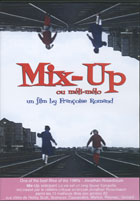
Mix-Up (ou Méli-Mélo) 2005
Distributed by Microcinema International/Microcinema DVD, 1636 Bush St., Suite #2, SF, CA 94109; 415-447-9750
Produced by Françoise Romand
Directed by Françoise Romand
DVD, color, 80 min.
Sr. High - Adult
Film Studies, Psychology, Adoption, Sociology
Date Entered: 12/04/2007
Reviewed by Debra Mandel, Head, Media Center, Northeastern University Libraries, Boston, MAOriginally released in 1986, Mix-Up is a documentary about two babies, Peggy and Valerie, who were mixed up at a hospital after their birth in 1936. French Director Françoise Romand interviewed the aging women and the Wheeler and Rylatt family members who describe how the truth of this unfortunate mistake unraveled. The daughters, siblings, mothers, and Mr. Wheeler share their perspectives with courtroom-like precision and honesty, and there’s an undertone of sadness throughout the film. Margaret Wheeler who believed she had the wrong baby from day one, speaks the most. She fastidiously researched all the angles and sought advice from playwright George Bernard Shaw. In turn, Valerie confessed that she was insecure, due to her never feeling loved by Margaret. By the time they reached 20, the women were finally informed about the mix-up, and Blanche Rylatt accepted that Valerie, not Peggy, was her true daughter.
Françoise Romand parsed this unusual human predicament with great delicacy and artistry. The camerawork and editing skills transformed this unique subject into a somewhat lyrical work. Besides incorporating archival photographs and footage of their homes, Romand inserted images—babies on scales, young girls on train tracks, and storytelling segments as dreamlike intrusions of an irrepressible past. A jarring yet whimsical soundtrack resonates like doleful pangs of surprise.
Mix-Up has an innocent old-fashioned feeling about it, which adds to its charm. Though these are not actors, you marvel at their performances, at their ability to boldly face the camera and recount their lives. Mix-Up is suitable for cinema studies classes learning about documentary styles. It can also be used in psychology classes which discusses family relationships and adoption.